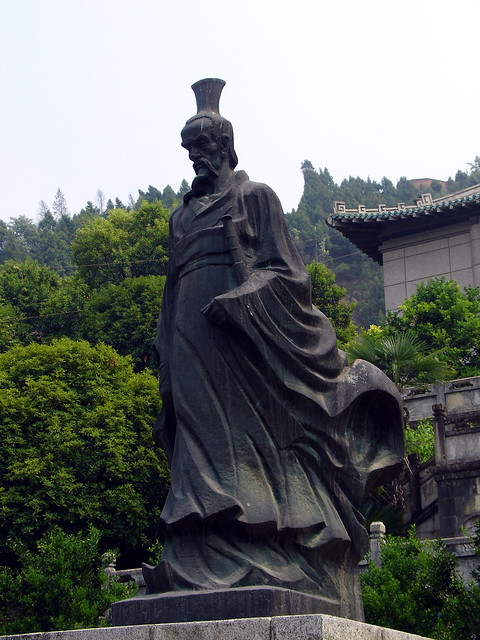The Poems of Qu Yuan Posted by sasha on Jun 5, 2019 in Culture
This Friday is the Dragon Boat Festival (端午节 – duān wǔ jié), a traditional holiday that’s celebrated on the 5th day of the 5th lunar month. While many know this Chinese festival for its exciting dragon boat races, it actually came about to honor a poet named Qu Yuan (屈原 – qū yuán). While we’ve had many posts on here over the years about the festival, today I’d like to take a closer look at the poems of Qu Yuan. First, a bit of background for those of you not familiar with the story.
The Story of Qu Yuan
Qu Yuan was born in 340 BC. He was a poet and a statesman for the Chu kingdom (楚国 – chu guó) during the Warring States Period (战 国时代 – zhàn guó shí dài). He served in high office and he advocated a policy of aligning with other kingdoms against the dominant Qin.
Unfortunately for Qu Yuan, he fell out of favor with King Huai of Chu (楚怀王 – chǔ huái wáng) after he was slandered by corrupt ministers. This happened after a man named Zhang Yi from the rival Qin State bribed these officials to turn the king against Qu Yuan. The king exiled Qu Yuan, and he soon suffered as a result. With his top adviser gone, he fell for the trickery of the Qin and his kingdom was eventually conquered.
Upon hearing that his kingdom’s capital had been overtaken by the Qin, Qu Yuan committed suicide by drowning himself in the Miluo River (汨罗江 – mì luō jiāng). As he was adored by people everywhere, the local people did everything in their power to try to either save Qu Yuan, or at the very least, to protect him in the afterlife.
It’s believed that people paddled out into the river on boats, either in an attempt to retrieve his body or just to scare the fish away. They also dropped sticky rice wrapped in bamboo leaves into the water so that Qu Yuan would be well fed in the afterlife. The bamboo was meant to ensure that the fish would not eat the famous poet’s rice. That’s where the modern day customs of rowing dragon boats and eating zongzi (粽子 – zòng zi) come from.
The Poems of Qu Yuan
Qu Yuan wrote some of the most famous poetry in all of Chinese literary history, expressing his love for his kingdom and his concerns for the future. He’s actually thought to be the first poet in Chinese history to have his name attached to his works. Prior to Qu Yuan, the name of the author was not given in poetic works. Qu Yuan’s style of writing was very innovative at the time, and would be copied by future generations.
His most famous work is Li Sao (离骚 – lí sāo), which means “Encountering Sorrow.” This is a part of the anthology known as Chu Ci (楚辞 – chǔ cí), the “Verses of Chu.” Li Sao is considered to be his magnus opus (伟大的工作 – wěi dà de gōng zuò).
It’s a very, very long poem, clocking in at over 350 lines and 2,400 characters. This makes it one of the longest poems from ancient China. It begins with Qu Yuan introducing himself and his background, and then moves on to describe his unfortunate situation about being exiled from his kingdom. He then goes on to recount his fantastic spiritual journey across China in places both real and imagined.
In this famous poem, Qu Yuan laments the corruption that has plagued his kingdom and resulted in his being banished. Despite the corruption that surrounds him, he is determined to remain righteous and pure. The poem uses a lot of vivid imagery and metaphors related to a type of Chinese shamanism. It’s not an easy read, but it sure is an interesting one!
If you really want to dive into the poems of Qu Yuan, you can click here to read Li Sao in its entirety. I also found a great video on YouTube where someone reads out the whole poem. They also added annotations to help you understand the meaning. This makes for a great listening and reading exercise:
Although many of the poems in Chu Ci were originally attributed to Qu Yuan, it was discovered that many of them were actually written centuries later during the Han Dynasty. Historians have debated the authorship of the poems in this anthology for many years, but most agree that Qu Yuan penned quite a few of them.
While it many never be known for sure, one thing is true – Qu Yuan lives on as a legend, with people all over China taking time to remember him on this important holiday. Even my young students – most of whom would rather be playing on their iPad than reading poetry – know about Qu Yuan and his work!
Before we go, here’s another video that does a good job telling the story of Qu Yuan. It’s in Chinese with English subtitles, so it’s great as a learning exercise:
祝你端午节快乐!
zhù nǐ duān wǔ jié kuài lè
Wishing You a Happy Dragon Boat Festival!

Build vocabulary, practice pronunciation, and more with Transparent Language Online. Available anytime, anywhere, on any device.





Leave a comment: